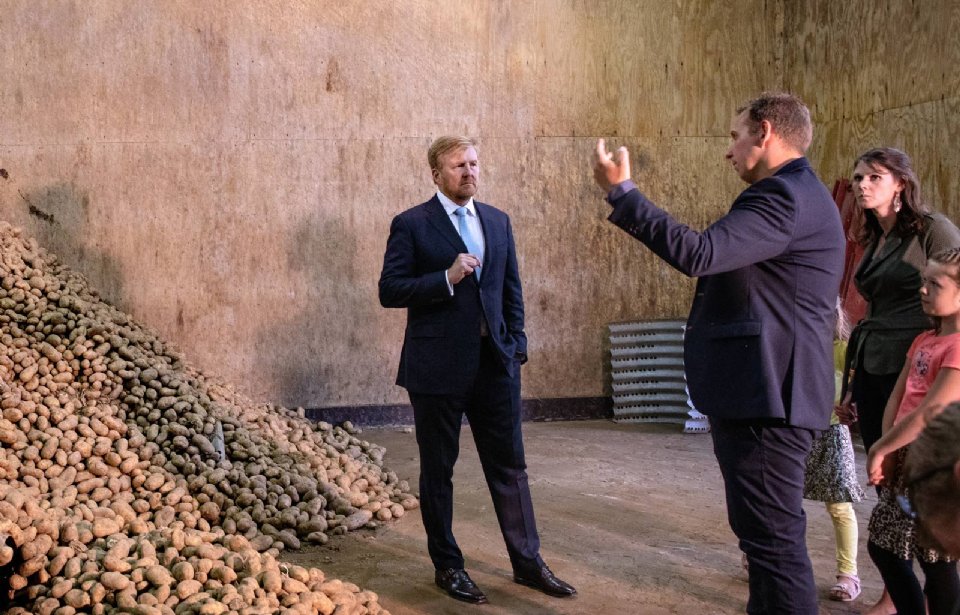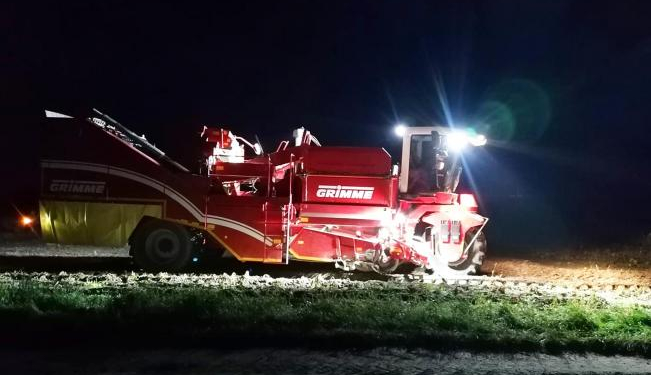Peter van der Poel from Abbenbroek received a visit from the king in July, who wanted to get an impression of the impact of corona on potato sales. The grower was very honored, but he is more concerned about the new sales season.
At their arable farm in Abbenbroek in South Holland, Peter and Rosalinda van der Poel told King Willem-Alexander extensively in July about the impact of corona on their farm . An important reason for the visit was the almost standstill of sales of chips potatoes. At the time, the couple was still wondering how the sale of some of their chips potatoes would proceed. They still had 750 tons of Ramos potatoes in storage: 300 tons free and 450 tons under contract for Farm Frites. The Innovators had just left before the coronavirus outbreak.
Two locations
Three months after the royal visit, the arable farmers tell how the sales of the chips potatoes have continued. They grow their potatoes at two locations on Voorne-Putten, in Abbenbroek where they live, and in Tinte, 10 kilometers away. Last year a total of 34 hectares.
PETER VAN DER POEL, ARABLE FARMER IN ABBENBROEK
The company in Abbenbroek is the parental company of Rosalinda van der Poel. In Tinte is the parental company of Peter van der Poel. That used to be a livestock farm. There is light, easily cultivable soil at that location. The entrepreneurs there grow potatoes 1 in 3. Such an intensive rotation is justified there, explains Peter van der Poel. ‘It has always been pasture land and we only grow early potato varieties there.’
Watering
Last season, Solist and Folva, both early table potato varieties, grew there. Van der Poel is positive about Soloist. He often harvests 50 tons of that variety in July. For such a yield it is necessary to irrigate regularly. ‘Four or five times is really necessary, otherwise Solist will give up quickly.’

The soil at the location in Abbenbroek is quite heavy. There the arable farmers grow the table potato variety Taisiya and the French fries varieties Ramos and Innovator. Van der Poel can only store potatoes at that company. There is room for 14 hectares in storage. That was the acreage that Rosalinda van der Poel’s father always cultivated. Peter and Rosalinda van der Poel took over that company two years ago and merged both companies.
A lot of land
The limited storage capacity is an important reason that the early varieties are now leaving land. But the growers want to be able to store more themselves. They already had drawings made for a new box storage facility at their current company, with mechanical cooling, especially for the long storage of table potatoes.
Van der Poel explains that the construction costs of box storage are slightly lower than storage with underground canals, because no pressure walls are required. But with the purchase of the boxes, the costs are roughly at the same level. In both cases, the mechanical cooling results in higher construction costs. But that plan has now been shelved for a while. ‘First wait and see how the corona crisis develops,’ says the arable farmer. He will also sell two-thirds of his potatoes off the land next season. He emphasizes that afland not only has disadvantages. ‘You have lower costs because you do not have to keep and you already have liquid assets early in the season. That’s handy. Moreover, it provides a good distribution of sales over the season. ‘
Pick up delayed
At the beginning of the corona period, Van der Poel was not so concerned about the sales of his French fries potatoes. ‘Normally I keep until May or June, so I wasn’t too nervous at first.’ But the customer continued to postpone the collection. The grower did have baking samples taken of the potatoes in his storage every two weeks. Ultimately, the customer complied with the contract. He picked up the potatoes for the agreed price. “We are pleased that the customer has fulfilled the contract,” says Rosalinda van der Poel.
Government compensation
Peter van der Poel first sold the remaining 300 tons of free potatoes for flakes, but that customer also kept postponing the collection. He then decided to sell the lot for 3 cents per kilo for animal feed, through a trader. With the government’s corona compensation of 6 cents per kilo, those free potatoes ultimately yielded 9 cents per kilo. “That’s bad, but not terribly bad.” All in all, the arable farmer has not had a bad potato year so far. But he is more concerned about the upcoming sales season than he was about last season. ‘The corona crisis continues and far fewer chips are being sold. No one can live on a 3 cent price. I do worry about that. I expect the potato acreage to shrink next year. ‘





